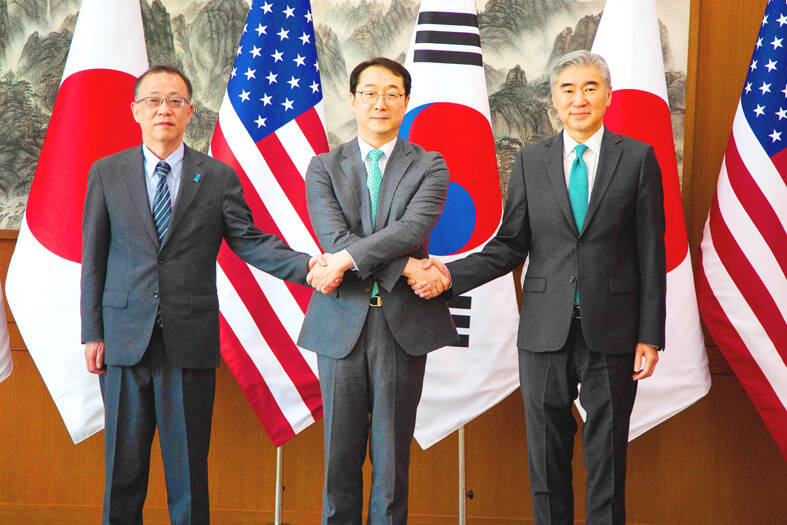Seoul, Washington and Tokyo yesterday urged UN member states to repatriate North Koreans working overseas, saying they continue to evade sanctions abroad to finance Pyongyang’s unlawful weapons program.
North Korea was also engaged in “malicious cyber activities” that supported its military expansion, representatives of the three countries said in a joint statement.
The nuclear-armed country has long made a fortune from the army of citizens it sends abroad to work, mostly in neighboring China and Russia, but also in Europe, the Middle East and Africa.

Photo: AFP
Under a UN Security Council resolution unanimously approved in 2017, member states had until December 2019 to send back all North Koreans working in their countries.
However, Seoul, Tokyo and Washington’s special envoys for North Korea yesterday said the country’s overseas workers are continuing to help fund Pyongyang’s increasingly aggressive provocations, following a trilateral meeting in the South Korean capital.
Overseas North Korean information technology workers “continue using forged identities and nationalities to evade [UN] sanctions and earn income abroad that funds the DPRK’s unlawful weapon of mass destruction and ballistic missile programs,” the envoys said in a joint statement, using the acronym for North Korea’s official name.
“We are also deeply concerned about how the DPRK supports these programs by stealing and laundering funds, as well as gathering information through malicious cyber activities,” they said.
The envoys accused Pyongyang of stealing up to US$1.7 billion in cryptocurrency last year.
In 2019, analysts said Beijing and Moscow — Pyongyang’s key allies — were issuing North Korean workers with alternative visas to ensure a continued supply of cheap labor.
North Korea last year declared itself an “irreversible” nuclear power, effectively ending the possibility of denuclearization talks.
North Korean Leader Kim Jong-un ordered his military to intensify drills last month to prepare for a “real war.”
In recent weeks, North Korea has tested what state media has claimed was an underwater, nuclear-capable drone, and carried out the launch of an intercontinental ballistic missile.
“We strongly condemn the DPRK’s repeated ballistic missile launches, as well as its escalatory and destabilizing rhetoric related to the use of nuclear weapons,” the envoys said.
“We express deep regret that the DPRK continues to ignore the hardship of its people, choosing instead to pour its scarce resources into its [weapons of mass destruction] and ballistic missile programs in clear violation of multiple United Nations Security Council resolutions,” they said.

The CIA has a message for Chinese government officials worried about their place in Chinese President Xi Jinping’s (習近平) government: Come work with us. The agency released two Mandarin-language videos on social media on Thursday inviting disgruntled officials to contact the CIA. The recruitment videos posted on YouTube and X racked up more than 5 million views combined in their first day. The outreach comes as CIA Director John Ratcliffe has vowed to boost the agency’s use of intelligence from human sources and its focus on China, which has recently targeted US officials with its own espionage operations. The videos are “aimed at

STEADFAST FRIEND: The bills encourage increased Taiwan-US engagement and address China’s distortion of UN Resolution 2758 to isolate Taiwan internationally The Presidential Office yesterday thanked the US House of Representatives for unanimously passing two Taiwan-related bills highlighting its solid support for Taiwan’s democracy and global participation, and for deepening bilateral relations. One of the bills, the Taiwan Assurance Implementation Act, requires the US Department of State to periodically review its guidelines for engagement with Taiwan, and report to the US Congress on the guidelines and plans to lift self-imposed limitations on US-Taiwan engagement. The other bill is the Taiwan International Solidarity Act, which clarifies that UN Resolution 2758 does not address the issue of the representation of Taiwan or its people in

US Indo-Pacific Commander Admiral Samuel Paparo on Friday expressed concern over the rate at which China is diversifying its military exercises, the Financial Times (FT) reported on Saturday. “The rates of change on the depth and breadth of their exercises is the one non-linear effect that I’ve seen in the last year that wakes me up at night or keeps me up at night,” Paparo was quoted by FT as saying while attending the annual Sedona Forum at the McCain Institute in Arizona. Paparo also expressed concern over the speed with which China was expanding its military. While the US

SHIFT: Taiwan’s better-than-expected first-quarter GDP and signs of weakness in the US have driven global capital back to emerging markets, the central bank head said The central bank yesterday blamed market speculation for the steep rise in the local currency, and urged exporters and financial institutions to stay calm and stop panic sell-offs to avoid hurting their own profitability. The nation’s top monetary policymaker said that it would step in, if necessary, to maintain order and stability in the foreign exchange market. The remarks came as the NT dollar yesterday closed up NT$0.919 to NT$30.145 against the US dollar in Taipei trading, after rising as high as NT$29.59 in intraday trading. The local currency has surged 5.85 percent against the greenback over the past two sessions, central